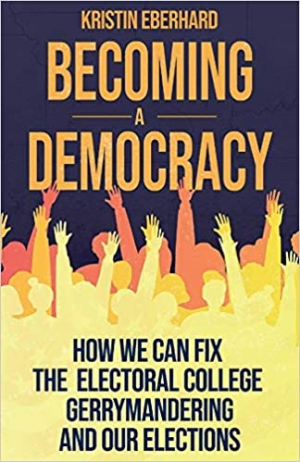Becoming a Democracy
How We Can Fix the Electoral College, Gerrymandering, and Our Elections
Becoming a Democracy makes a timely, informed case for correcting the US’s electoral system.
Kristin Eberhard’s Becoming a Democracy is a thorough, impartial reference text for those who hope to foster democracy in the United States.
Eberhard, a program director at a Seattle-based think tank, devotes her text to identifying problems with the US’s election system. At present, she writes, voting in the US is complicated; most Americans feel that elected officials do not represent their interests, resulting in apathy and general dissatisfaction. Without favoring individual parties, she covers the origins of such distrust and proposes tactical solutions, including increased focus on legislative efforts to tackle looming social challenges. The playbook considers how other democracies are structured as well.
To do this work, the book first discusses the right to vote. It suggests ways of simplifying registration, of keeping people registered, and of casting votes. Its are concrete ideas for making elections easier, cheaper, and more secure. The book then proposes balancing the impact of moneyed special interest groups on elections and policies by amplifying the power of smaller donors through democracy vouchers; this idea could facilitate citizen-funded elections and a broader spectrum of candidates, the book says.
The book suggests means of ensuring that every voter feels heard; these are designed to combat a general sense that voters’ choices are limited. It also addresses gerrymandering, a problem that Eberhard says is compounded by the electoral college and a minority-rule Senate. It also covers topics including automatic voter registration, ranked choice voting, the National Popular Vote Interstate Compact, proportional representation, and ways to make the Senate more representative of a diverse nation.
Eberhard’s language is clear and concise, and her arguments are internally backed by data and endnotes. Attractive graphics complement the text, illustrating trends and state-by-state conditions. Each chapter features case studies and anecdotes that show policies in practice and their impacts. Chapters close with helpful summaries, action items for implementing change, and thoughtful discussion questions. Other useful features include the book’s glossary; its appendix, which highlights organizations that support democracy; and its bibliography, which is filled with supporting documentation and suggestions for further reading.
In the end, this is a readable guide that inspires the actions needed to rectify what ails American democracy. Its practical ideas for ensuring that US elections are free, fair, and secure are likely to get ordinary people more involved in the lawmaking process. Though it risks becoming dated as policies change, Becoming a Democracy makes a timely, informed case for correcting the US’s electoral system.
Reviewed by
Wendy Hinman
Disclosure: This article is not an endorsement, but a review. The publisher of this book provided free copies of the book and paid a small fee to have their book reviewed by a professional reviewer. Foreword Reviews and Clarion Reviews make no guarantee that the publisher will receive a positive review. Foreword Magazine, Inc. is disclosing this in accordance with the Federal Trade Commission’s 16 CFR, Part 255.

